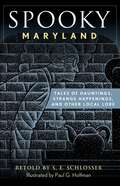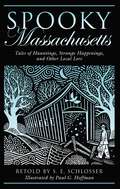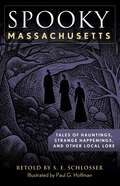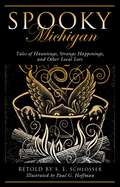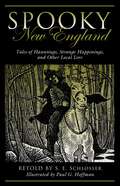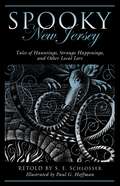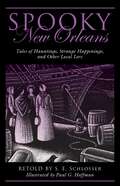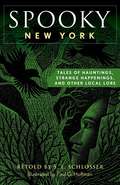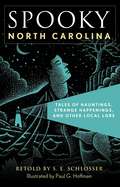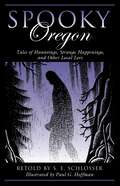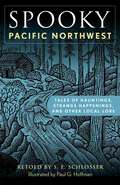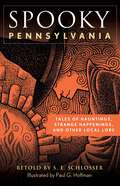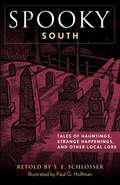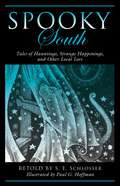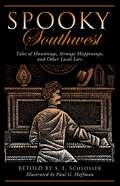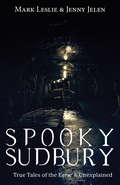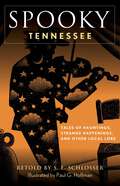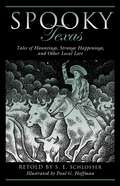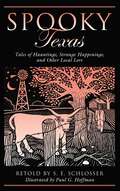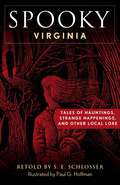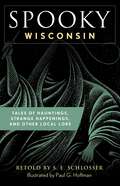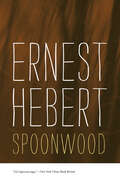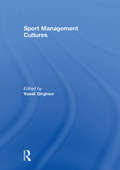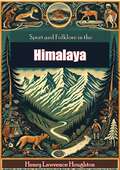- Table View
- List View
Spooky Maryland: Tales of Hauntings, Strange Happenings, and Other Local Lore (Spooky)
by S. E. SchlosserPull up a chair or gather round the campfire and get ready for thirty-four creepy tales of ghostly hauntings, eerie happenings, and other strange occurrences in Maryland. Set in the Old Line State&’s city streets, rural communities, wooded mountains, and vast shoreline, the stories in this entertaining and compelling collection will have readers looking over their shoulders again and again. Maryland&’s folklore is kept alive in these expert retellings by master storyteller S. E. Schlosser and in artist Paul Hoffman&’s evocative illustrations. Set way back near the cold, calm waters of Crisfield, in the quiet rural farmlands of Venton, and in the dark, heavily wooded swamplands of Cambridge, the stories in this entertaining and compelling collection will have you looking over your shoulder again and again. Readers will feel an icy wind on the back of their necks on a warm evening. Whether read around the campfire on a dark and stormy night or from the backseat of the family van on the way to grandma&’s, this is a collection to treasure.
Spooky Massachusetts: Tales Of Hauntings, Strange Happenings, And Other Local Lore (Spooky)
by S. E. SchlosserWhat better locale to consider for spooky happenings than the home of the Salem witch trials? From mysteries at sea to ghosts and unexplained footprints, you&’ll shiver your way through these mesmerizing tales. Set in the state&’s historic towns, charming old islands, and sparsely populated backwoods, the stories in this entertaining and compelling collection are great for the whole family.
Spooky Massachusetts: Tales of Hauntings, Strange Happenings, and Other Local Lore (Spooky)
by S. E. SchlosserWhat better locale to consider for spooky happenings than the home of the Salem witch trials? From mysteries at sea to ghosts and unexplained footprints, you'll shiver your way through these mesmerizing tales. Set in the state's historic towns, charming old islands, and sparsely populated backwoods, the stories in this entertaining and compelling collection are great for the whole family.
Spooky Michigan: Tales of Hauntings, Strange Happenings, and Other Local Lore (Spooky)
by S. E. SchlosserPull up a chair or gather round the campfire and get ready for twenty-five creepy tales of ghostly hauntings, eerie happenings, and other strange occurrences in Michigan. Set in Michigan&’s historic towns and sparsely populated backwoods, the stories in this entertaining and compelling collection will have you looking over your shoulder again and again. Michigan folklore is kept alive in these expert retellings by master storyteller S. E. Schlosser, and in artist Paul Hoffman&’s evocative illustrations. You&’ll hear otherworldly voices and things that go bump in the night, and feel an icy wind on the back of your neck on a warm summer evening. Whether read around the campfire on a dark and stormy night or from the backseat of the family van on the way to grandma&’s, this is a collection to treasure.
Spooky New England: Tales Of Hauntings, Strange Happenings, And Other Local Lore (Spooky)
by S. E. SchlosserA collection of folktales highlighting famous and not-so-famous New England ghosts, mysterious happenings, powers of darkness, and wonders of the invisible world. Pull up a chair or gather round the campfire and get ready for 35 creepy tails of ghostly hauntings, eerie happenings, and other strange occurrences in Maine, New Hampshire, Vermont, Connecticut, Rhode Island, and Massachusetts. Set in New England's historic towns, charming old islands, and sparsely populated backwoods, the stories in this entertaining and compelling collection will have you looking over your shoulder again and again.Yankee folklore is kept alive in these expert retellings by master storyteller S.E. Schlosser, and in artist Paul Hoffman's evocative illustrations. You'll meet seaweed-covered phantom sailors and a ghostly black dog, hear otherworldly voices and things that go bump in the night, and feel an icy wind on the back of your neck on a warm summer evening. Whether read around the campfire on a dark and stormy night or from the backseat of the family van on the way to grandma&’s, this is a collection to treasure.
Spooky New Jersey: Tales of Hauntings, Strange Happenings, and Other Local Lore (Spooky)
by S. E. SchlosserPull up a chair or gather round the campfire and get ready for 35 creepy tales of ghostly hauntings, eerie happenings, and other strange occurrences from times past. Set deep in the Pinelands and Ramapo Mountains, along the Atlantic coast, and in historic towns like Burlington and Springfield, the stories in this entertaining and compelling collection will have you looking over your shoulder again and again.New Jersey folklore traditions are kept alive in these expert retellings by master storyteller S. E. Schlosser and in artist Paul Hoffman's evocative illustrations. You'll meet ghosts and witches, hear things that go bump in the night, and feel an icy wind on the back of your neck on a warm summer evening. Whether read around the campfire on a dark and stormy night or from the backseat of the family van on the way to grandma's, this is a collection to treasure.
Spooky New Orleans: Tales of Hauntings, Strange Happenings, and Other Local Lore (Spooky)
by S. E. SchlosserPull up a chair or gather round the campfire and get ready for creepy tales of ghostly hauntings, eerie happenings, and other strange occurrences under the New Orleans skies. Whether read around the campfire on a dark and stormy night or from the backseat of the family van on the way to grandma's, this is a collection to treasure.
Spooky New York: Tales Of Hauntings, Strange Happenings, And Other Local Lore (Spooky)
by S. E. SchlosserPull up a chair or gather round the campfire and get ready for thirty creepy tales of ghostly hauntings, eerie happenings, and other strange occurrences in New York. Set in the Empire State's big cities, historic towns, rugged lakes, and sparsely populated backwoods, the stories in this entertaining and compelling collection will have readers looking over their shoulders again and again.New York's folklore is kept alive in these expert retellings by master storyteller S. E. Schlosser and in artist Paul Hoffman's evocative illustrations. Readers will meet the White Lady of Rochester, dance to the rival fiddlers in Brooklyn, hear otherworldly voices in the Catskills, and run into the things that go bump in the night on Long Island--or simply feel an icy wind on the back of their necks on a warm New York evening. Whether read around the campfire on a dark and stormy night or from the backseat of the family van on the way to grandma's, this is a collection to treasure.
Spooky North Carolina: Tales of Hauntings, Strange Happenings, and Other Local Lore (Spooky)
by S. E. SchlosserThe spirit of a railroad flagman shines his lantern along the tracks near Maco, where he lost his head in a train accident. The ghost of a girl haunts the grave robbers who stole her corpse to use in a college medical department. And in a swamp outside Smithfield, a grisly mass hanging is re-created on dark nights. All this and much more!
Spooky Ohio: Tales Of Hauntings, Strange Happenings, And Other Local Lore (Spooky)
by S. E. SchlosserPull up a chair or gather round the campfire and get ready for twenty-five creepy tales of ghostly hauntings, eerie happenings, and other strange occurrences in this all-new addition to the best-selling Spooky series. Set in the Buckeye State&’s big cities and rural communities, along the shores of Lake Erie in the north to the Appalachian Mountains in the south, the stories in this entertaining and compelling collection will have readers looking over their shoulders again and again. Ohio&’s folklore is kept alive in these expert retellings by master storyteller S. E. Schlosser and in artist Paul Hoffman&’s evocative illustrations. Readers will see the mystery of the missing postmaster&’s cousin solved, relive the long night a ghost captain saved a sinking ship, laugh along with a prankster who capitalizes on a barber&’s ghost, and feel an icy wind on the back of their necks on a warm Ohio evening. Whether read around the campfire on a dark and stormy night or from the backseat of the family van on the way to Grandma&’s, this is a collection to treasure.
Spooky Oregon: Tales of Hauntings, Strange Happenings, and Other Local Lore (Spooky)
by S. E. SchlosserSpooky happenings throughout OregonPull up a chair or gather &‘round the campfire and get ready for forty creepy tales of ghostly hauntings, eerie happenings, and other strange occurrences from times past! Oregon folklore traditions are kept alive in these expert retellings by master storyteller S. E. Schlosser and through artist Paul Hoffman&’s evocative illustrations. You&’ll meet ghosts and witches, hear things that go bump in the night, and feel an icy wind on the back of your neck on a warm summer evening. Now with brand new stories, this entertaining and compelling collection will have you looking over your shoulder again and again.
Spooky Pacific Northwest: Tales of Hauntings, Strange Happenings, and Other Local Lore (Spooky)
by S. E. SchlosserPull up a chair or gather 'round the campfire and get ready for creepy tales of ghostly hauntings, eerie happenings, and other strange occurrences from times past! Pacific Northwest folklore traditions are kept alive in these expert retellings by master storyteller S.E. Schlosser and through artist Paul G. Hoffman's evocative illustrations. You'll meet ghosts and witches, hear things that go bump in the night, and feel an icy wind on the back of your neck on a warm summer evening. The stories in this entertaining and compelling collection will have you looking over your shoulder again and again.
Spooky Pennsylvania: Tales Of Hauntings, Strange Happenings, And Other Local Lore (Spooky)
by S. E. SchlosserPull up a chair or gather round the campfire and get ready for thirty-eight creepy tales of ghostly hauntings, eerie happenings, and other strange occurrences in Pennsylvania. Set in the Keystone State&’s big cites, rural communities, rugged mountains, and vast woodlands, the stories in this entertaining and compelling collection will have readers looking over their shoulders again and again. Pennsylvania&’s folklore is kept alive in these expert retellings by master storyteller S. E. Schlosser and in artist Paul Hoffman&’s evocative illustrations. Readers will meet the phantom drummer of Valley Forge, cheer on the ghost who haunts a bowling alley in Allentown, search for the mysterious jail cell handprint in Carbon County, and feel an icy wind on the back of their necks on a warm Pennsylvania evening. Whether read around the campfire on a dark and stormy night or from the backseat of the family van on the way to grandma&’s, this is a collection to treasure.
Spooky South: Tales of Hauntings, Strange Happenings, and Other Local Lore (Spooky)
by S. E. SchlosserHere we have a collection of unnerving tales of events that happened--and still do happen--in the collective back yard of the Deep South states. Accompanied by evocative illustrations, these compelling retellings of 43 popular folktales feature supernatural occurrences and ghosts of all sorts, from fiddling ghosts to the story of the Jack o'Lantern. Whether read around the fire on a dark and stormy night or in the backseat of the family van on the way to Grandma's, each expertly told tale is guaranteed to make readers look at the South--and over their shoulders--again and again.
Spooky South: Tales of Hauntings, Strange Happenings, and Other Local Lore (Spooky)
by S. E. SchlosserHere we have a collection of unnerving tales of events that happened--and still do happen--in the collective back yard of the Deep South states. Accompanied by evocative illustrations, these compelling retellings of 40 popular folktales feature supernatural occurrences and ghosts of all sorts, from fiddling ghosts to the story of the Jack o'Lantern. Whether read around the fire on a dark and stormy night or in the backseat of the family van on the way to Grandma's, each expertly told tale is guaranteed to make readers look at the South--and over their shoulders--again and again.
Spooky Southwest: Tales Of Hauntings, Strange Happenings, And Other Local Lore (Spooky)
by S. E. SchlosserA collection of folktales highlighting famous and not-so-famous Southwestern ghosts, mysterious happenings, powers of darkness, and wonders of the invisible world. Here we have a collection of unnerving tales of events that happened—and still do happen—in the collective back yard of the Southwestern states. Accompanied by evocative illustrations, these compelling retellings of popular folktales feature supernatural occurrences and ghosts of all sorts, from cattle rustlers to runaway trains. Pull up a chair or gather round the campfire and get ready for 35 creepy tails of ghostly hauntings, eerie happenings, and other strange occurrences in Nevada, Utah, Arizona, Colorado and New Mexico, and Texas. Set in the American Southwest's historic towns and sparsely populated expanses, the stories in this entertaining and compelling collection will have you looking over your shoulder again and again.
Spooky Sudbury: True Tales of the Eerie & Unexplained
by Mark Leslie Jenny JelenThe magnetic aura surrounding Sudbury, for both the living as well as the once-alive, is the backdrop for tales of mystery, wonder, and outright horror. "I tried to leave" is a common theme for those from the Sudbury region. People often vow to move away, but something about the Nickel City keeps luring them back. Whether it’s the taste of fresh air – or just the sulphur in the air – it’s hard to move beyond the black rocks, endless lakes, and great openness without longing to come home. Some are so attached to the northern community that they choose to stick around, even when their physical life is over. After all, if the living can’t leave the place behind, why should the dead? Spooky Sudbury explores the magnetic aura surrounding the city, for the living as well as the once-alive, in these tales of the supernatural.
Spooky Tennessee: Tales of Hauntings, Strange Happenings, and Other Local Lore (Spooky)
by S. E. SchlosserPull up a chair or gather 'round the campfire and get ready for twenty-eight creepy tales of ghostly hauntings, eerie happenings, and other strange occurrences from times past! Tennessee folklore traditions are kept alive in these expert retellings by master storyteller S.E. Schlosser and through artist Paul G. Hoffman's evocative illustrations. You'll meet ghosts and witches, hear things that go bump in the night, and feel an icy wind on the back of your neck on a warm summer evening. The stories in this entertaining and compelling collection will have you looking over your shoulder again and again.
Spooky Texas: Tales Of Hauntings, Strange Happenings, And Other Local Lore (Spooky)
by S. E. SchlosserSuitably, hauntings and paranormal happenings in the Lone Star state are larger than life. Included in this must-read collection are tales of the ghost lights of Marfa, the werewolf of Elroy, and the Devil&’s brand in the eternal roundup of El Paso. Your hair will stand on end as you read about the mysteries and lore in Spooky Texas.
Spooky Texas: Tales Of Hauntings, Strange Happenings, And Other Local Lore (Spooky)
by S. E. SchlosserSuitably, hauntings and paranormal happenings in the Lone Star state are larger than life. Included in this must-read collection are tales of the ghost lights of Marfa, the werewolf of Elroy, and the Devil&’s brand in the eternal roundup of El Paso. Your hair will stand on end as you read about the mysteries and lore in Spooky Texas.
Spooky Virginia: Tales of Hauntings, Strange Happenings, and Other Local Lore (Spooky)
by S. E. SchlosserPull up a chair or gather 'round the campfire and get ready for thirty-four creepy tales of ghostly hauntings, eerie happenings, and other strange occurrences from times past! Virginia folklore traditions are kept alive in these expert retellings by master storyteller S.E. Schlosser and through artist Paul G. Hoffman's evocative illustrations. You'll meet ghosts and witches, hear things that go bump in the night, and feel an icy wind on the back of your neck on a warm summer evening. The stories in this entertaining and compelling collection will have you looking over your shoulder again and again.
Spooky Wisconsin: Tales of Hauntings, Strange Happenings, and Other Local Lore (Spooky)
by S. E. SchlosserPaul Bunyan and Babe, Native American legends, ghosts, river mysteries, and more populate the pages of Spooky Wisconsin. You'll meet the shrouded horseman of Milwaukee, the troll of Mount Horeb, the dark horse of the Dells, and more as you join folklorist S. E. Schlosser to discover the spooky stories from the Badger state, from the Illinois border to Lake Superior, and the Mississippi River to Lake Michigan.
Spoonwood: The Darby Chronicles #6 (The Darby Chronicles)
by Ernest HebertLife, love, death, and laughs in a small American town After almost fifteen years, Hebert has returned to this rich literary landscape for a new novel of the changing economic and social character of New England. Hebert's previous Darby book, Live Free or Die, recounted the ill-fated love between Freddie Elman, son of the town trash collector, and Lilith Salmon, child of Upper Darby gentility. At its conclusion, Lilith died giving birth to their son. As Spoonwood opens, Freddie, consumed by grief and anger and struggling with alcoholism, is not prepared to be a father to Birch. But as both his family and Lilith's begin to maneuver for custody of the child, Freddie embarks on a course of action that satisfies none of them. Once again, Hebert masterfully conveys the natural and social landscape of contemporary rural New England. Grounded in complex, fully realized characters, Spoonwood offers Hebert's most optimistic vision yet of acceptance and accommodation across class lines.
Sport Management Cultures
by Vassil GirginovThis is the first book to address the link between culture and sport management. The aim is to demonstrate that culture profoundly affects how we research, teach and practice sport management. The book engages with the concept of culture both as an abstract analytical category and specific beliefs and practices. It recognizes that a single best way of managing does not exist; that the applicability of management theories may stop at national boundaries; and that fundamental cultural values act as a strong determinant to managerial ideology and practice. Culture makes the study of sport management interesting because it challenges many taken-for-granted assumptions about management, yet it reinforces our belief in the existence of common management problems. The book offers a comprehensive review of the conceptualisations of culture and its relation with sport management by examining a range of issues: the emergence of multiculturalism as a policy issue; the impact of commonly shared cultural values within the fitness industry on managers and organisations behaviour; building cultural bridges in community sport organisations; cultural meanings attached to the consumption of Olympic merchandise, and culturally-informed interpretation through a reflective analysis of sport management texts. This book was published as a special issue of European Sport Management Quarterly.
Sport and Folklore in the Himalaya
by Henry Lawrence HoughtonSport and Folklore in the Himalaya by Henry Lawrence Houghton offers a captivating blend of adventure, natural history, and cultural insight, drawing from the author’s experiences in the remote and majestic regions of the Himalayas. Written with the spirit of an explorer, the book provides vivid accounts of hunting expeditions, encounters with wildlife, and the unique traditions and folklore of the people living in this awe-inspiring landscape.Houghton takes readers on thrilling hunting excursions, pursuing game such as ibex, markhor, and Himalayan tahr, while also offering keen observations on the behavior and ecology of these animals. His detailed descriptions of the challenges posed by the rugged terrain and unpredictable weather reflect both the physical demands and the exhilaration of sport in the high mountains. Yet the book is more than just a hunting memoir—it delves into the rich folklore, beliefs, and customs of the Himalayan communities, revealing the deep connection between these people and their environment.Through engaging storytelling, Houghton brings to life the legends, superstitions, and traditions of the indigenous groups he encountered. He explores topics ranging from local festivals and religious practices to folk tales about spirits and mythical creatures said to inhabit the mountains. His respectful portrayal of these cultures highlights the interplay between nature, belief, and survival in one of the most challenging environments on earth.Sport and Folklore in the Himalaya will appeal to readers interested in adventure literature, travel writing, and ethnography. Houghton’s narrative offers both excitement and reflection, capturing the beauty, mystery, and cultural richness of the Himalayan region. This book stands as a valuable historical document, preserving stories of a time when exploration and hunting were intertwined with the discovery of new landscapes and cultures, now on the cusp of modern change.
